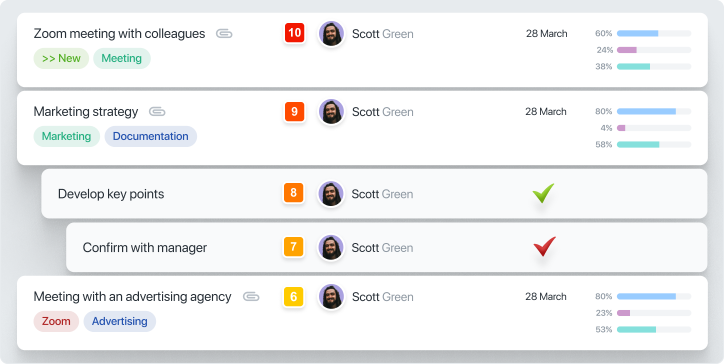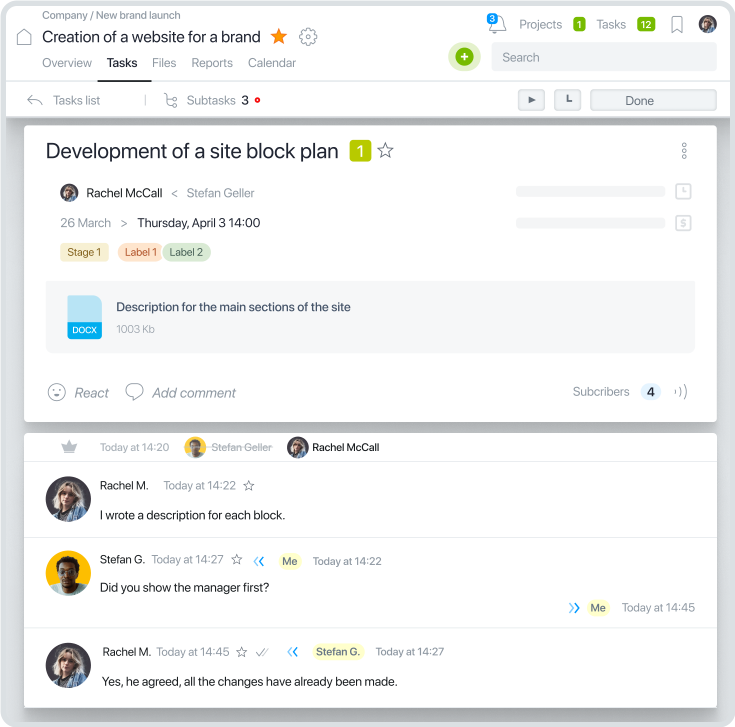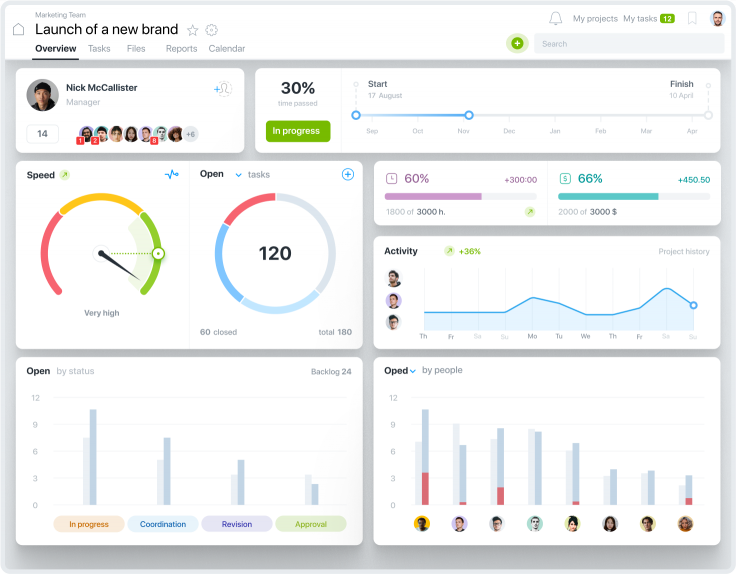Project management plays a significant role in companies that make products or provide services in various fields. Marketing is no exception. Here, project management provides marketing teams with structured planning, project status monitoring and their timely completion. To get the most out of the approach, we advise you to use useful tips. Here are some of them.
Why is good project management important for marketing teams?
To understand the importance of project management for marketing teams, it is worth outlining the features of such teams:
- Creativity. Marketing is often impossible without this component. For example, the idea ofa marketing project such as the development of a new brand or advertising campaign is something that cannot be implemented without creativity and non-standard views on ordinary things.
- Focus on customer needs. Marketing projects should ultimately meet the needs of both the customer and the target audience. Therefore, it is extremely important to focus on understanding their needs and preferences. In this way, it will be possible to guarantee that the final product or service meets the customers’ needs.
- Time limits. Marketing projects often have specific deadlines. Here it should be clear that from the beginning they are established taking into account market conditions. Therefore, unexpected delays in the work process can lead to untimely release of the product, making it useless. And a product that was not timely adjusted to market demands may not be relevant. Therefore, project management in marketing must be flexible enough to accommodate all these changes, while ensuring timely product availability.
- Cooperation with other departments. Marketing projects often involve close interaction with other specialists: designers, copywriters, analysts, etc. Accordingly, project management should facilitate effective communication between teams with different specializations.
- Important indicators. Marketing projects should be measurable and have clear indicators of progress and success.

With this in mind, let’s move on to what project management gives marketing teams.
First of all, it allows decomposition, dividing complex projects into manageable tasks. After that you can distribute responsibilities among team members, ensuring that everyone works in the same space and can adequately assess the state of affairs. Project management tools for marketing agencies can help with this. They allow marketers to track progress, set deadlines, and identify potential limitations before they become problems.
Also, good project management facilitates communication and collaboration between team members (or teams) and customers, ensuring that everyone has the information he needs to do his part of the job. Here, of course, you can’t do without internal knowledge bases, task trackers integrated with messengers, Gantt charts, etc.
Another advantage of project management is a structured approach to management as a whole.
In addition, effective project management allows marketing teams to quickly adapt to changing circumstances and market conditions, ensuring their competitiveness.

Finally, project management becomes the foundation for continuous growth, allowing teams to learn from their successes and failures, improving processes over time.
Now it is clear what project management for marketing teams is aimed at. So let’s move on to tips that will help you get the best possible result.
Tip #1. Define clear goals and objectives
Above we said that digital indicators are of great importance in marketing projects. In order for them to correctly reflect the project status and be updated in a timely manner, work goals must be set. Their complete execution will mean that everything is 100% done.
To make the work easier, and the final goal not too distant and unattainable, a list of tasks is compiled that brings the team closer to the final result. Accordingly, work on each task is also recorded. The team is really motivated by visible results.

For example, the entire project is divided into five main stages. Each stage has three intermediate stages. When the team sees that it has completed the first of the main stages and has already done a third of the second one, people understand that they are moving forward. When milestones are also tied to calendars and budgets, it’s even easier for both the team and the customer to measure performance.
But one more point is important here: absolutely all participants in the process must know the goals and objectives. Ideally, when they are agreed via common discussion. That is, the team is not just informed of goals and deadlines for implementation, but also discusses how realistic they are. Even in the case when decisions about the terms and scope of work are made by top managers and team leaders, it is necessary to inform each employee as clearly and detailed as possible.
It is also important to make sure that everyone understands what needs to be done and when. Here we move on to the next important point. Local goals must be aligned with the overall strategy. This is important for the following reasons:
- Higher success rates. This study found that companies with no alignment problems were 72% more profitable than their competitors.
- Clear work with priorities. When employees know the strategic goals of the project, it is easier for them to understand which intermediate goals and objectives have a significant impact on their achievement. Accordingly, such work has a higher priority.
- Understanding one’s own contribution to the overall result. This is important because a person who feels self-important usually performs better. To feel this importance, one should not guess, but know what the value of a particular work is.
So, don’t forget to communicate goals and objectives to the team and to each individual. Yes, it may seem like it’s taking too much time, but it’s better to communicate information, hear the questions, and answer them before doing the tasks. In the end, this will give a better result than correcting mistakes made due to lack of information.
Tip #2. Create a detailed marketing plan for the project
The importance of planning is difficult to overestimate, because it affects literally all subsequent processes. Therefore, the more detailed your plan is, the higher the probability that it will be completed on time and really well.

If the plan is only in a generalized form, there is a risk that important details have been overlooked, and this will emerge only with deadlines approaching.
To make your planning more effective, please consider the following steps:
- Involve not only team leaders in planning, but also other employees. We mentioned this above. Discussions become especially important when the project involves cooperation between different departments. Sometimes the opinions of different specialists allow for a more accurate time estimate.
- Assess the risks and find ways to manage them. Here, again, it’s a good idea to involve representatives of all relevant departments in the planning to see as many potential problems as possible.
- Hold a general meeting with the representatives of the customer and contractors. This will make sure that everyone has the same understanding of the goals and the future progress of the work.
- Use the best project management systems. They will allow you to have all you need for coordinated and productive work in one space.
- Be ready to change. Even if the plan seems perfect to you, you should not stick to it at all costs. It is better to make changes, if required, for example, by the market situation.
Tip #3. Pay maximum attention to communications
When the planning is complete, one can hope that everything will be transparent and predictable: everyone will just start doing the tasks assigned to him.
In fact, this does not always happen. Very often, problems appear because of difficulties with communications. Someone did not understand where to look for information, someone forgot to answer the request, and someone did not provide timely access, for example, to the test server. As a result, unresolved issues accumulate, some tasks are done at random, and some remain undone.
To avoid this, all interested parties should communicate: in writing, in voice, in task managers, etc. There is no way to manage digital marketing projects without it.

Communication within a task in the Worksection project management system
The optimal solution would be using services for project management, which provide tools for communication. For example,
- comments on assignments;
- the possibility to attach files of various formats;
- integration with mail and/or messengers;
- built-in chat.
When the team has all of the above or a large part of it, there will definitely be fewer problems with communication. To reduce them to a minimum, you can write down the communication regulations. For example, urgent questions should be asked in the messenger, and information that does not require a quick response can be left in a comment to the task.
Tip #4. Constantly monitor the progress of the project
Even in your thoughts, you should not assume that the work can be done well without a clear understanding of the state of affairs at each specific moment.
Control is especially important in large-scale projects involving many people. Having overlooked a small thing, you can soon get a problem, the elimination of which costs far too much. It is not about micromanagement, which harms projects and teams, but about timely control.
Therefore, it is worth using project management tools for marketing agencies, which offer control and monitoring functions. For example, Gantt charts, Kanban boards, project dashboards, etc.

Project Dashboard in the Worksection
This is really convenient, because it allows the manager to see on one screen whether the project is moving according to plan. In case of problems, you can study the indicators and figure out what to do to level the situation. When there are several projects (and this is widespread in marketing teams), it is almost impossible to monitor the status quickly without such tools.
To make this advice work, it is worth telling all employees that such software is useful for everyone and is not a tool of repression at all.
On the contrary, advanced services remind you in time about the tasks for which the deadline is approaching, and can also show that a certain employee has, for example, a 40 hours workload this week. So trying to give him an additional amount of work is not advisable.
It may seem that it is possible to monitor key indicators in manual mode. In fact, it is, but such things take a lot of time, so the decision-making will not be prompt, and in marketing, you often have to act quickly to have success.
Tip #5. Record everything you can
When answering the question of how to become better in marketing or in any other field, it should be understood that the key to continuous improvement of individual teams and the company as a whole is experience. At the same time, it should not be accumulated in the heads of individual employees, but in documents.
It is necessary to record both successful decisions and failures. In the future, this information will help to avoid mistakes and allow beginners to solve tasks as efficiently as possible based on past experience.
These tips for managing marketing teams are sure to deliver results if they are integrated into the life of your business. If you follow them systematically and clearly, positive changes in work will appear quite quickly. Over time, you will understand how to use each of the tips in the teamwork, taking into account the features of your business and the needs of your customers.
